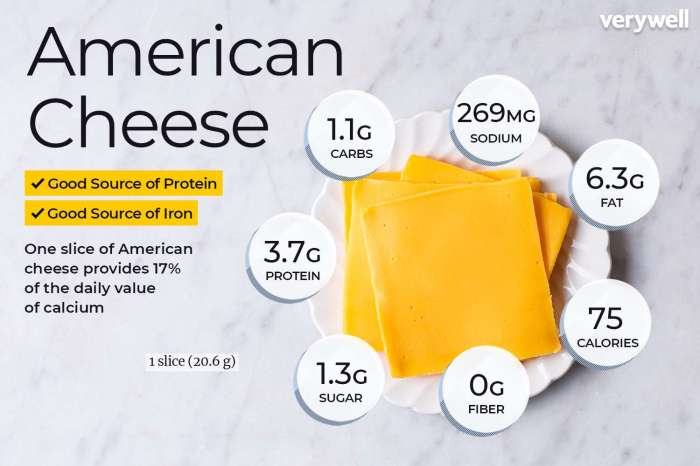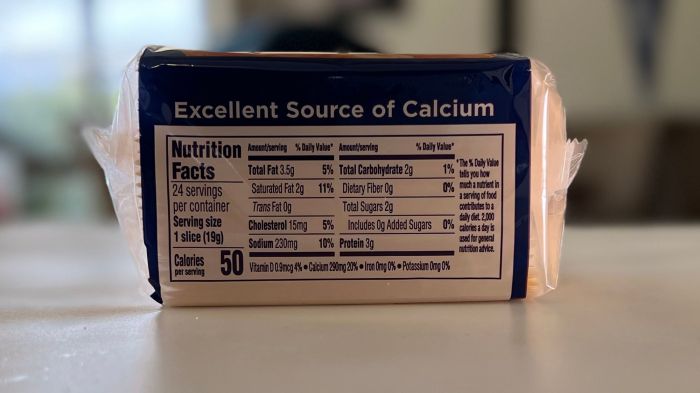Nutritional Composition of a Slice of American Cheese

Slice of american cheese nutrition facts – American cheese, a staple in many lunches and sandwiches, offers a convenient source of protein and calcium. However, understanding its nutritional profile is crucial for making informed dietary choices. This section provides a detailed breakdown of the nutrients found in a single slice.
Macronutrient Breakdown
A standard slice (approximately 1 ounce or 28 grams) of American cheese typically contains around 70-80 calories. The macronutrient composition varies slightly depending on the brand and specific recipe, but generally consists of roughly 6-8 grams of fat, 6-7 grams of protein, and 1 gram of carbohydrate. A significant portion of the fat is saturated fat, often ranging from 4-5 grams per slice.
Cholesterol content usually falls between 15-20 milligrams per slice. It’s important to remember that these are approximate values, and always check the nutrition label on the specific product you are consuming.
A cursory examination of slice of American cheese nutrition facts reveals a high sodium content and a relatively low concentration of certain vitamins compared to its fat content. However, a comparative analysis necessitates considering alternative cheeses, such as those detailed in this insightful resource on goat milk cheese nutrition , which often boast a richer profile of nutrients.
Returning to the American cheese, its processed nature significantly impacts its nutritional value, a stark contrast to the often more artisanal goat milk varieties.
Vitamins and Minerals
American cheese is a reasonable source of certain vitamins and minerals. A single slice can contribute a small amount of calcium, crucial for bone health, often around 10-15% of the recommended daily intake. It also provides trace amounts of vitamins A and D, although these quantities are typically less significant than the calcium content. The exact vitamin and mineral content will vary based on the manufacturing process and the ingredients used.
Added Ingredients and Their Impact
Many commercially produced American cheeses contain added ingredients beyond milk and salt. Common additives include emulsifiers (like sodium citrate) to improve texture and prevent separation, and preservatives (like sodium phosphate) to extend shelf life. While these ingredients generally don’t pose significant health risks in moderate consumption, they can affect the overall nutritional profile and may be a concern for individuals with specific dietary sensitivities or preferences.
For example, high sodium content is a common feature in processed cheeses, something to be mindful of for those watching their sodium intake.
Nutritional Information Per Slice (Approximate Values)
| Nutrient | Amount | Unit | % Daily Value (DV) |
|---|---|---|---|
| Calories | 75 | kcal | – |
| Total Fat | 7 | g | – |
| Saturated Fat | 4.5 | g | – |
| Cholesterol | 18 | mg | – |
| Sodium | 200 | mg | – |
| Total Carbohydrate | 1 | g | – |
| Protein | 7 | g | – |
| Calcium | 150 | mg | – |
| Vitamin A | 5 | mcg | – |
| Vitamin D | 1 | mcg | – |
Comparison with Other Cheese Types: Slice Of American Cheese Nutrition Facts

American cheese, while convenient and widely used, differs significantly in its nutritional profile compared to other popular cheese varieties. Understanding these differences can help consumers make informed choices based on their dietary needs and preferences. This comparison focuses on fat, protein, and sodium content, key nutritional aspects often considered in cheese selection.
Generally, American cheese tends to be lower in fat and protein than many other cheeses, but often higher in sodium. This is largely due to its processing method, which involves blending different cheeses and adding emulsifiers and other ingredients. Other cheeses, such as cheddar, Swiss, and mozzarella, often retain more of their natural characteristics and thus exhibit variations in their nutritional composition.
Nutritional Comparison of Cheese Types
The following table provides a comparison of the nutritional values per serving (approximately 1 ounce) of American, Cheddar, Swiss, and Mozzarella cheeses. Note that values can vary slightly depending on the brand and specific type of cheese.
| Cheese Type | Fat (g) | Protein (g) | Sodium (mg) |
|---|---|---|---|
| American Cheese | 8 | 7 | 300 |
| Cheddar Cheese | 9 | 7 | 170 |
| Swiss Cheese | 8 | 8 | 180 |
| Mozzarella Cheese | 8 | 7 | 140 |
Note: These values are approximate and may vary based on brand and specific product. Always refer to the nutrition label on the specific product for accurate information.
Variations in American Cheese Nutritional Content
The nutritional content of American cheese can vary depending on the brand and specific type of American cheese. For example, some brands may use different milk sources, resulting in variations in fat content. Others might adjust the recipe to reduce sodium levels, catering to health-conscious consumers. Additionally, “processed” American cheese slices often contain added ingredients like emulsifiers and preservatives, which can influence the overall nutritional profile.
Looking at the nutrition facts panel on the packaging is essential to make accurate comparisons between different brands and types.
Impact on Dietary Needs
American cheese, a staple in many diets, presents a mixed bag nutritionally. Its nutritional profile significantly impacts various dietary needs, both positively and negatively, depending on individual requirements and overall dietary patterns. Understanding its composition is key to incorporating it responsibly into a balanced eating plan.American cheese’s nutritional content needs to be carefully considered within the context of specific dietary goals.
While it can contribute to certain needs, it can also hinder others. This section will explore these complexities, focusing on common dietary restrictions and health goals.
American Cheese and Low-Sodium Diets
American cheese is notoriously high in sodium. A single slice can contain a significant portion of the recommended daily sodium intake for many individuals. Therefore, individuals following a low-sodium diet, often prescribed for managing hypertension or other health conditions, should severely limit or avoid American cheese. Substituting it with lower-sodium cheese alternatives or opting for sodium-reduced versions, if available, is advisable.
Carefully checking nutrition labels and selecting cheeses with less than 140mg of sodium per serving is recommended for those managing sodium intake.
American Cheese and Low-Fat Diets
While lower-fat versions of American cheese exist, the original often contains a relatively high percentage of saturated fat. Saturated fat intake should be limited in low-fat diets to help manage cholesterol levels and reduce the risk of heart disease. Individuals following a low-fat diet should consume American cheese sparingly, prioritizing leaner protein sources and low-fat dairy alternatives. Choosing reduced-fat or fat-free cheese options is crucial for those prioritizing a low-fat intake.
Remember to check the nutrition label for saturated fat content per serving.
American Cheese and High-Protein Diets, Slice of american cheese nutrition facts
American cheese can contribute to protein intake, although it is not a primary source. It provides a modest amount of protein per slice, which could be beneficial for those aiming to increase their protein intake, especially in combination with other protein-rich foods. However, relying solely on American cheese to meet high protein requirements is not recommended due to its relatively high saturated fat and sodium content.
A balanced approach that combines American cheese with leaner protein sources like chicken, fish, beans, or lentils is more advisable for a high-protein diet.
Health Implications of Regular American Cheese Consumption
Regular consumption of American cheese can have several health implications, primarily due to its high sodium and saturated fat content. High sodium intake is linked to hypertension and increased risk of cardiovascular diseases. Excessive saturated fat intake can elevate LDL (“bad”) cholesterol levels, also contributing to cardiovascular problems. While moderate consumption might not pose significant risks for healthy individuals, regular and substantial intake of American cheese should be approached with caution, especially for those with pre-existing conditions or dietary restrictions.
Moderation is key to minimizing potential health risks associated with its consumption.
Common Queries
Is American cheese a good source of protein?
Yes, a slice of American cheese provides a moderate amount of protein, contributing to daily protein intake.
Does American cheese contain lactose?
Generally, yes, American cheese does contain lactose, although the amount can vary depending on the brand and processing. Individuals with lactose intolerance may experience symptoms.
How does the sodium content of American cheese compare to other cheeses?
American cheese often has a higher sodium content compared to some other cheeses, so individuals on low-sodium diets should be mindful of their intake.
Can I eat American cheese on a low-fat diet?
While American cheese contains fat, it can be included in moderation on a low-fat diet as part of a balanced meal plan. Look for lower-fat options if available.
